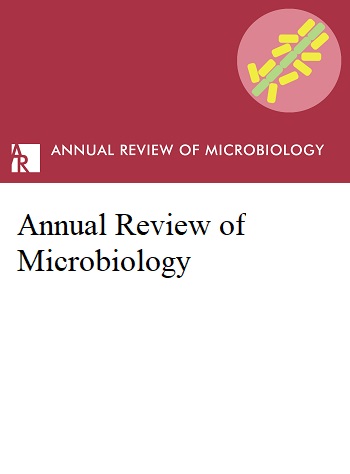宿主-寄生虫共同进化中的表观遗传学重编程:弓形虫范式。
IF 8.5
1区 生物学
Q1 MICROBIOLOGY
引用次数: 1
摘要
像许多细胞内病原体一样,弓形虫原虫已经进化出复杂的机制,通过注射效应蛋白来促进其在各种宿主中的传播和持久性,这些效应蛋白可以操纵其入侵细胞中的许多过程。具体来说,寄生虫将宿主表观遗传调节剂和修饰剂从其固有功能中转移出来,重新连接宿主基因表达,以抵消先天免疫反应并限制其强度。寄生虫和宿主之间的军备竞赛加速了效应蛋白的适应性进化和它们使用的非常规分泌途径。本文综述了弓形虫效应物如何通过内在无序结构域的进化、超分子复合物的形成和分子模仿的使用,靶向宿主转录因子作为协调节点,以及染色质修饰酶,来控制感染细胞的命运和最终感染的结果。预计《微生物学年鉴》76卷的最终在线出版日期为2022年9月。修订后的估计数请参阅http://www.annualreviews.org/page/journal/pubdates。本文章由计算机程序翻译,如有差异,请以英文原文为准。
Epigenetic Reprogramming in Host-Parasite Coevolution: The Toxoplasma Paradigm.
Like many intracellular pathogens, the protozoan parasite Toxoplasma gondii has evolved sophisticated mechanisms to promote its transmission and persistence in a variety of hosts by injecting effector proteins that manipulate many processes in the cells it invades. Specifically, the parasite diverts host epigenetic modulators and modifiers from their native functions to rewire host gene expression to counteract the innate immune response and to limit its strength. The arms race between the parasite and its hosts has led to accelerated adaptive evolution of effector proteins and the unconventional secretion routes they use. This review provides an up-to-date overview of how T. gondii effectors, through the evolution of intrinsically disordered domains, the formation of supramolecular complexes, and the use of molecular mimicry, target host transcription factors that act as coordinating nodes, as well as chromatin-modifying enzymes, to control the fate of infected cells and ultimately the outcome of infection. Expected final online publication date for the Annual Review of Microbiology, Volume 76 is September 2022. Please see http://www.annualreviews.org/page/journal/pubdates for revised estimates.
求助全文
通过发布文献求助,成功后即可免费获取论文全文。
去求助
来源期刊

Annual review of microbiology
生物-微生物学
CiteScore
18.10
自引率
0.00%
发文量
37
期刊介绍:
Annual Review of Microbiology is a Medical and Microbiology Journal and published by Annual Reviews Inc. The Annual Review of Microbiology, in publication since 1947, covers significant developments in the field of microbiology, encompassing bacteria, archaea, viruses, and unicellular eukaryotes. The current volume of this journal has been converted from gated to open access through Annual Reviews' Subscribe to Open program, with all articles published under a CC BY license. The Impact Factor of Annual Review of Microbiology is 10.242 (2024) Impact factor. The Annual Review of Microbiology Journal is Indexed with Pubmed, Scopus, UGC (University Grants Commission).
 求助内容:
求助内容: 应助结果提醒方式:
应助结果提醒方式:


